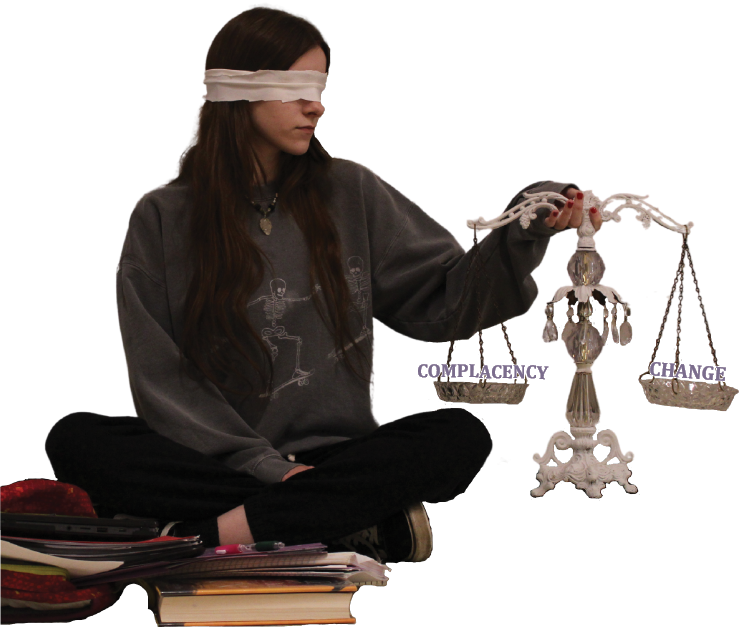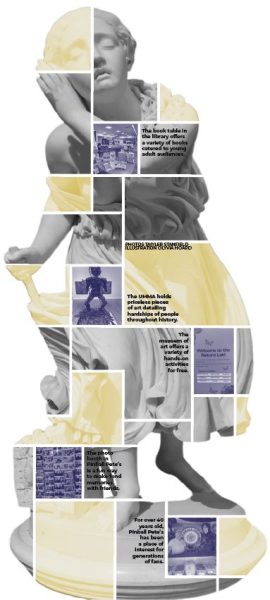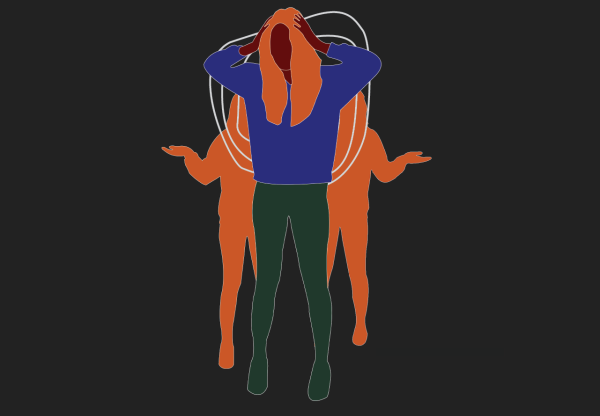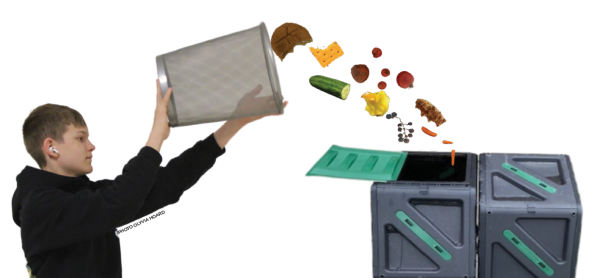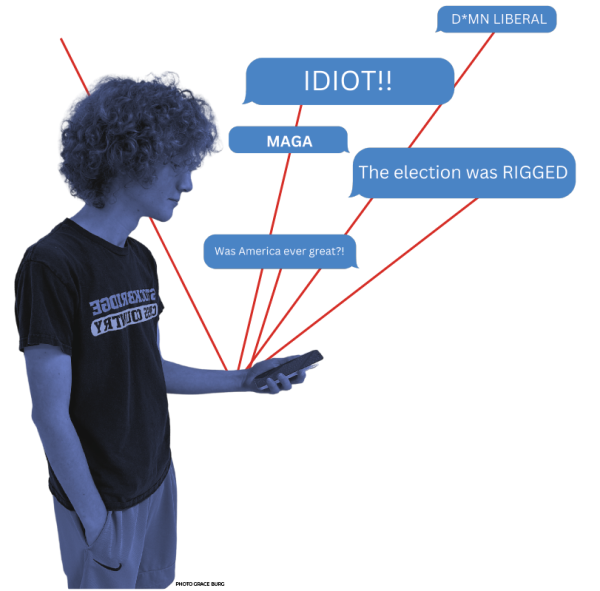Slammed by the hand book
Based on Lady Justice who honors unbiased equity. This photo symbolizes how some students feel as if they are ignored instead of being listened to.
When students returned to school this year, they were met with detailed disciplinary and parking guidelines. A couple months later, all chromebooks were programmed to monitor student activity.
Not long ago, the attendance and chromebook charging policies were also changed so that students can be punished for coming to school without a charged chromebook.
A study done by Frontiers in Psychology found that the majority of students in Western countries like the United States had a negative and unproductive reaction to stricter school environments.
Though the official return to in-person school happened last year, administrators decided it was time to return to normalcy by more strictly enforcing the rules in the handbook.
“We’re focused on getting back to the normal with some improvements,” principal Jeff Trapp said.
Students have noticed the changes and are confused by the ways school has begun to differ from previous school years.
“A lot of the rules that they are enforcing have been in the handbook for so long,” senior Donavin Pignanello said. “I don’t know why they waited until this year to enforce them.”
A tiered violation system has been developed that categorizes different violations in terms of their severity and the resulting punishment that students receive. Some students don’t feel that the tiers are entirely just.
“It makes no sense to me how throwing food in the lunchroom is equivalent to bringing a gun to school but they are both group three violations,” junior Jalen Rogozinski said.
Many of the rules have come about as a result of middle school behavior. The switch of the high school schedule to six periods has led to a closer union between the middle and high school not only in schedule but also in policy.
What many older students find frustrating is most of the rules that were heavily enforced have been caused by behavior of middle schoolers that share the same building.
“I feel the school cares more about students’ behavior than their education,” sophomore Bella Eccleton said.
While it does make sense to have strict rules for the younger students, it shouldn’t mean older and more responsible students should have to abide by the same set.
High school is the place where students are supposed to start transitioning to act like an adult yet these rules erase the transitional period by keeping high schoolers under tighter rules than are necessary.
“It makes me feel like I’m in a kind of prison or something because they’ve made rules so much more strict,” Pignanello said. 
Administrators have tried to promote good habits in students and keep them safe by hiring a school liaison to do things like patrol the hallways, watch the parking lot and make sure students don’t engage in any illegal activity on school grounds.
“My biggest job responsibility is making sure the school is safe and the students are safe,” school liaison Zach Mendez said.
Not all students feel that they are promoting good habits, but feel rather that they can’t be trusted.
“I don’t like the stricter rules because it feels like they target me,” Rogozinski said.
Not all of the changes are geared toward student safety. Rules relating to attendance and parking, for example, are intended to restore good habits in students and prepare them for their lives after high school.
“We are trying to reestablish good practices and good habits,” superintendent Brian Friddle said. “COVID-19 had a lot of negative effects on us and we’re trying to combat those negative effects with good habits.”
One of these good habits is attendance. If students exceed seven days of absence in one class, their credit for that class may be taken away if their grade goes below 77%. Students don’t understand why those with good grades and good behavior should be prohibited from taking all of the days that they may need.
“Everyone needs days to themselves,” junior Evan Sandecki said. “Everyone is going to get sick more than seven times.”
Another rule that is not new but is being enforced more strictly this year is parking passes. It says in the handbook that those who fail to have a parking pass will be punished. Students provide the school with information about their vehicle and sign a contract that allows the school to search their vehicle.
“I think it’s unfair,” senior Kyle Armstrong said. “It’s not about the money, I just feel like it’s an invasion of privacy.”
The administration, however, believes there is good reason behind it.
“There’s a safety aspect there,” Trapp said. “It’s important for us to know who’s in our parking lots.”
In order to get their parking passes, students are required to pay five dollars to park in the student lot and 40 dollars to park in the front parking lot. Students who park in the front without paying 40 dollars are often harshly reprimanded, even if there are an abundance of open spots.
“Paying for parking is ridiculous,” senior Arianna Place said. “We’re already forced to come here so why would you make us pay? Even if it is a small amount of money, it’s still money.”
The administration has said that some of the money students put toward parking passes goes toward the processing of the passes, while the extra money, around $500, is put into the student activity account.
“This account is used for a variety of reasons including helping with student materials, field trip costs or even something like the student section T-Shirts we bought this year,” Trapp said.
Using the student parking lot comes with a price, but accessing the bathrooms should be guaranteed to students.
A concern for many students in the past couple years has been the closing of the bathrooms during classes, lunches and passing times. The school has given reasons to shut down a bathroom, the most prevalent being substance abuse and vandalism.
“We don’t want things like vandalism and that’s why we’re asking people to stay in the cafeteria during lunch or even closing a bathroom down for a period of time where we see abuse happening there,” Friddle said.
Many students have had to go to further bathrooms when the one closest to them has been closed. This is hard for the students because they only have a five minute passing period to get from one class to another.
“I understand why they close the bathrooms,” junior Chloe Suter said. “But at the same time it’s stupid because I have to go across the whole school to go to a different bathroom.”
The administration thinks that these rules are working toward improving the lives of students, but many students feel the opposite.
“It just feels oppressive,” Place said. “Students deserve a certain amount of freedom that we just aren’t getting.”

Lilly Williams is editor-in-chief of Uncaged and has been on staff since her sophomore year. She is currently a senior and plans to attend college for...

Standing 151 cm tall and running on spite alone, Nicole Wadkins is the Web developer and Creative editor for Uncaged. This is her second year joining the...



